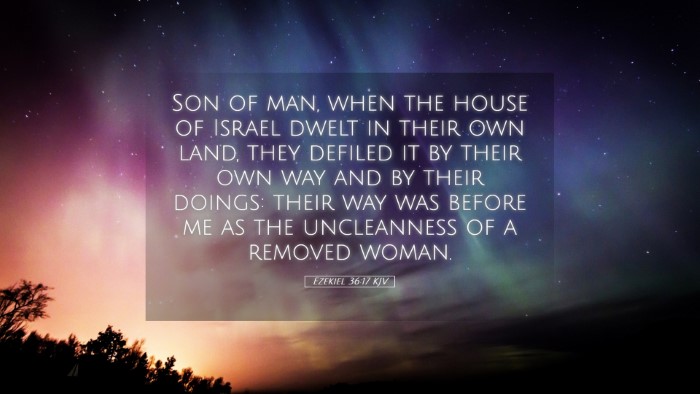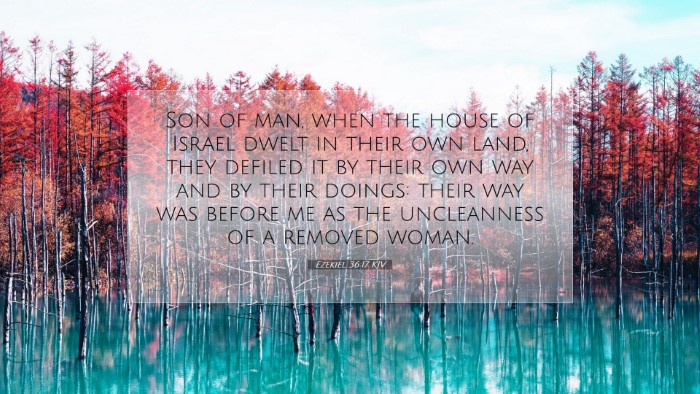Ezekiel 36:17 - Commentary Summary
Verse Context and Content: Ezekiel 36:17 reads, “Son of man, when the house of Israel dwelt in their own land, they defiled it by their own way and by their doings: their way was before me as the uncleanness of a removed woman.” This verse forms part of a larger prophetic context through which God, through Ezekiel, addresses the sins of Israel and their consequent moral and spiritual decline.
Purpose of the Prophecy
The prophecies of Ezekiel serve as a clarion call to the people of Israel regarding their moral condition and their need for spiritual renewal. This particular verse outlines the seriousness of Israel’s actions, emphasizing how their conduct in the land of promise was not just a personal failing, but a violation of covenant with God.
Commentary Insights
Matthew Henry’s Commentary
Matthew Henry asserts that the phrase "defiled it" illustrates the deep moral corruption that penetrated every aspect of Israel's life. He elaborates that their ways—marked by idolatry and social injustice—were an affront to God, showing a clear breach of their covenantal relationship. The 'uncleanness of a removed woman' metaphor is particularly vivid, depicting both a state of impurity and a deeper spiritual estrangement from God.
Albert Barnes’ Notes on the Bible
Albert Barnes notes that this depiction of sin as "uncleanness" emphasizes the idea that the inhabitants of Israel disfigured their connection to God through their actions. He reflects on the holiness of God, against which the secluded liberties of the people starkly contrast. Barnes explains that this uncleanness caused God to withdraw His presence from them, leading to judgment and exile. The consequences of sin, he posits, are spiritual distance and loss of divine favor.
Adam Clarke’s Commentary
Adam Clarke provides additional cultural insight, explaining that within the context of ancient Israel, purity laws were vital. He interprets the "removed woman" as representative of both physical uncleanliness and a spiritual condition that alienates one from God. Clarke suggests that through their actions, the Israelites essentially divorced themselves from the sanctity required of them under the covenant. He emphasizes that God's pronouncement here serves both as condemnation and a precursor to the hope of restoration.
Theological Implications
The implications of Ezekiel 36:17 for theology are profound, especially regarding understanding sin, holiness, and the nature of God’s relationship with His people. Key themes include:
- Sin and Defilement: The text portrays sin not merely as individual actions but as a fundamental defilement of the community and covenant.
- The Holiness of God: God’s reaction to Israel’s actions underscores His holiness and the corresponding standard of conduct expected from His people.
- Judgment and Restoration: While the passage announces judgment for sin, it inherently points towards the hope of restoration, a recurring theme in the book of Ezekiel.
Practical Application for Today
In light of this discussion, pastoral and teaching applications can be drawn from Ezekiel 36:17. In preaching or teaching this verse, one may focus on:
- Self-Examination: Encouraging congregants to reflect on personal and collective sins that may defile their spiritual walk with God.
- Emphasis on Holiness: The call to holiness—even in the life of the church—where God’s people are reminded of their identity as a holy nation, set apart for His purposes.
- Hope in Restoration: Highlighting God’s grace and the possibility of redemption even after failings, reminding believers that God desires to cleanse and restore.
Conclusion
Ezekiel 36:17 serves as a powerful reminder of the consequences of sin, the holiness of God, and the call to repentance and restoration. The insights gained from public domain commentaries enrich our understanding of the text and enhance our spiritual applications. This verse challenges readers to pursue a life of holiness and attentiveness to the call of God, illustrating that while humanity often falls short, God's desire is for reconciliation and a renewed covenant with His people.


